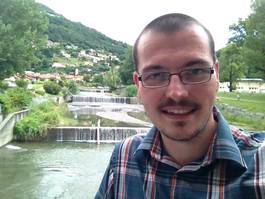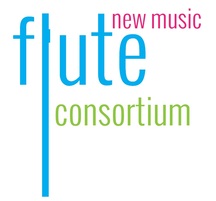Get to Know...Mark Wolf You may have figured out by now that we’re kind of nerdy. We love to track statistics about the composition contest. We’ve been so excited to see entries from all over the world! We get really excited to see entries from new countries. The winner of the solo flute category this year, Mark Wolf (for Hamarøy Troll), is from Australia! Now, we’ve had winners and/or finalists from five of the six inhabited continents (we haven’t had a finalist or winner from Africa...although we’ve had one entry) We’re looking forward to featuring Mark in a winner’s video interview which, thanks to technology, we’ll be able to complete via skype. But, we’re happy to share this composer spotlight in the meantime so you can learn more about him and his music! Q&A with Mark… What is/are your favorite “new music” piece/s and why? It is difficult to choose a single favourite piece so here are 3 out a possible 10. Arcana (1927) by Edgar VarèseArcana is highly attractive to the ear. Scored for a very large orchestra (quintuple winds), I have an appreciation for its highly selective instrumental textures, timbre, and sonorities. The polyphonic contrast ranges from full flamboyant orchestral tutti to Mahler-like moments where the piece could pass for chamber music. The Triumph of Time (1971-72) by Harrison Birstwistle, much of Bistwistle’s music has a paradoxical timeless quality. The Triumph of Time again scored for large orchestra runs for almost a half an hour and seems to have no real beginning or ending. It is as if only a portion of the whole work is witnessed. Quatre Chants pour Franchir le Seuil (1996-98) by Gérard Grisey. While studying for my Masters of Music at the Royal College of Music, London. I was introduced to the work of the French spectral composer Gérard Grisey. I was instantly hooked. This time, scored for soprano soloist and large ensemble, the title translates to Four Songs for Crossing the Threshold. A song cycle which explores the threshold between life and dealth, the mostly fragile haunting music, like meditation, releases the sole and powerfully persuades an acceptance for death. There are only a small handful of works which have had a profound impression on me as much as Grisey’s Quatre Chants, especially because of Grisey’s coincidental sudden death after completing the piece. Describe your musical background and current activities. It all started for me at age 12 when I first took up piano lessons. The following year I picked up a trumpet. Learning the classical and romantic repertoire on piano and playing trumpet in youth orchestras sparked the insatiable desire to compose my own original music. For as long as I can remember I have been particularly fascinated with how, either natural or man-made objects, are created, engineered or produced. How it is they have come into being? What are the building blocks? This brings us to the subject of my current PhD research which is focused on the parallels found between architectural ‘space’ and musical ‘time.’ Over the past three and a half years, I have composed several works which are, in a sense, translations of architectural ‘space’ into temporal musical experiences. The buildings I have chosen to translate are not just any old buildings but were carefully selected for their unconventional spatial design qualities. Architectural spatial design which questions engineering principals and on the surface, seems to defy logic. It is the extremities of architectural design which excites and fuels my need to write music. An enthusiasm equaled to when I first started composing. Do you have any upcoming events that you would like our friends and followers to know about? Recently, I was announced winner of the Etymos Ensemble 2017 Call for Scores Competition for my solo vibraphone piece Umbra-Penumbra-Antumbra. As a result, the winning work will be published by Edizioni Sconfinarte and was performed this fall at the following festivals:
My latest work, Spiral Spring for large ensemble, was performed by the players of the Queensland Symphony Orchestra conducted by Peter Luff at the Composers in Concert Event at the Queensland Conservatorium, November 19. Mark was recently accepted to the 2018 Mixtur Festival: Composition and Sound Experimentation Workshop, taking place in Barcelona, Spain in April 2018. More About Mark…. Mark Wolf is an alumnus of the Elder Conservatorium of Music, Adelaide, Victorian College of the Arts, Melbourne and the Royal College of Music, London. He also attended the ICon Arts Academy in Romania as well as the Soundstreams Emerging Composer Workshop in Toronto, and the Soundstream Emerging Composers Forum in Adelaide. Wolf's concert music has received recognition through commissions by Núcleo Música Nova, the British Harpsichord Society, clarinettist Ona Cardona, the Taylor Wessing Photographic Portrait Prize, and the Melbourne Symphony Orchestra; premièred at venues including Teatro da Reitoria Brazil, Handel House London, St Martin-in-the-Fields, the National Portrait Gallery UK and the Melbourne Recital Centre. Wolf’s work has been featured at various international festivals including: IV Bienal Música Hoje, soundSCAPE Festival, ICon Arts Festival, and the 5th and 6th Darwin International Guitar Festivals; performed by ensembles such as Ensemble Móbile, Resound Duo, RTÉ Contempo Quartet, and the Sydney Guitar Trio. In 2017, Wolf was announced the winner of both the Etymos Ensemble Call for Scores and the Flute New Music Consortium Composition Competition. He was also the winner of the 2015 ICon Arts International Composition Competition. Wolf is currently the recipient of an Australian Research Training Scholarship, undertaking his PhD candidature at Queensland Conservatorium, Griffith University. If you Like Hamaroy Troll… Hamarøy Troll 7’ flute recording 2010 Rubin’s Vase 2’ flute, saxophone, guitar, percussion, violin, cello recording 2017 Miniature Structure No. 3 3’ flute, bass trombone, vibraphone 2015 Less is a Bore 12’ flute, clarinet, violin, cello, piano work in progress Elegy 3’ flute/bass flute, oboe, clarinet/bass clarinet, bassoon recording 2007 City of Melbourne 13’ flute/piccolo, Clarinet in A/Bb, viola, french horn recording 2006 Twelve on Two 12’ piccolo/flute, 2 clarinets, tenor saxophone, recording 2002 trombone, 3 violins, viola, 2 cellos Stubborn Disposition 4’ flute, violin, piano recording 2002 Zenith 6’ flute, 2 guitars, violin, viola, cello recording 2002
0 Comments
Leave a Reply. |
AuthorThe Flute New Music Consortium is an organization dedicated to the creation and support of new music for the flute. Archives
June 2019
Categories
All
|

 RSS Feed
RSS Feed
